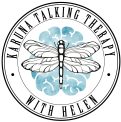The search...
You've realised that you aren't feeling like yourself and may be experiencing persistent sadness. Despite trying various self-help methods, such as walking daily, eating better, and aiming for a good night's sleep, you still feel lost and are struggling. You decide to explore therapy and begin searching for a counsellor. This process can be overwhelming due to the abundance of available counsellors, so you start by focusing on issues that resonate with you and narrowing down your options. Yet, you are still confronted with a myriad of counsellors, each with different qualifications, skills, and experiences. Who do you choose?
Merry (2020) highlights that the therapeutic relationship between you and your counsellor is the key factor in achieving the growth and change you seek. Merry (2020) explains that this relationship should provide a space where you feel completely comfortable sharing your feelings and emotions. Through this experience, you can explore your issues safely, knowing that you have someone alongside you on your 'journey', someone who listens and accepts you unconditionally (Merry, 2020).
A good therapeutic relationship is characterised by trust, respect, and understanding, which continues to build as the sessions progress. It is a connection between you and the counsellor, a therapeutic bond where you feel supported and acknowledged.

A therapeutic relationship should include:
- Trust: Knowing that whatever you bring to the session is held confidentially by your counsellor.
- Respect: The counsellor and you show understanding and respect to each other, creating a safe space.
- Genuine Care: When your counsellor shows genuine empathy to you, and you feel heard and understood.
- Honesty: The counsellor displays an open and honest manner and in turn helps you to be honest with your feelings
As a person-centred counsellor, in particular, the relationship is seen as key to helping a person grow and discover what is causing them difficulties and find solutions, as the quote by Carl Rogers states below:
“In my early professional years I was asking the question: How can I treat, or cure, or change this person? Now I would phrase the question in this way: How can I provide a relationship which this person may use for 'their' own personal growth?”
Carl R. Rogers
How will I aim to offer you a good therapeutic relationship?
I will always aim to ensure that our therapeutic space is private and confidential, so you can feel safe and comfortable. I adhere strictly to the BACP ethical framework, ensuring you are fully informed and that I always work within my competence and ability. My practice is grounded in unconditional positive regard, meaning I receive you without judgement. I aim to help you feel heard, respected, and valued, creating a safe environment for you to explore your emotions and experiences. I provide clear boundaries within our professional relationship, maintaining consistency and open communication.
I also offer you my genuineness, openness, and belief in your ability to know what is right for you.
I offer a free 20-minute initial conversation for you to meet me, see if you feel comfortable and make sure I am the right counsellor for you. Please get in touch.
References:
Merry, T. (2020). Learning and being in Person-Centred Counselling
